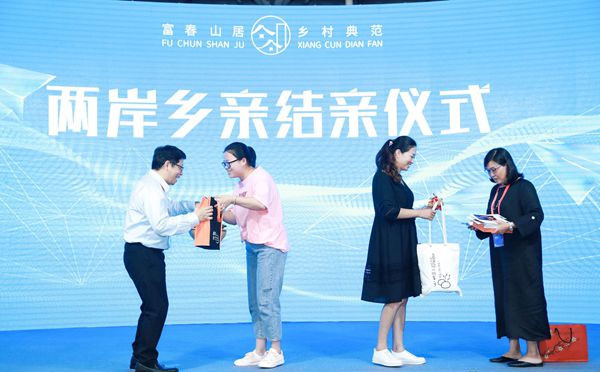Unique project uses ancient painting to forge closer bonds


The event "I have a home in Fuyang" invites homestay owners in Taiwan to visit villages in Fuyang.[Photo provided to China Daily]
Dwelling in the Fuchun Mountains by Huang Gongwang from the Yuan Dynasty (1271-1368) is one of China's best-known ancient paintings.
The painting, which was torn into two in the 17th century, was shown in its entirety for the first time in more than 360 years at the Palace Museum in Taipei in June of 2011.
The painting is based on scenery in Hangzhou's Fuyang district, in Zhejiang province.
Now, an event "I have a home in Fuyang", is inviting homestay owners in Taiwan to visit villages in Fuyang, and pair up with local villagers to share experiences about revitalizing rural areas.
The event was launched at a forum on rural revitalization on June 2 in Fuyang, and hosted by government of Fuyang district, the Zhejiang branch of China News Service and the China Academy for Rural Development at Zhejiang University.
Lee Ching-sung, a professor from the Department of Restaurant, Hotel and Institutional Management at Fu Jen Catholic University in Taiwan said at the forum that to attract more tourists and talent to rural areas without damaging the environment is a key objective of rural revitalization.
Lee said that leisure agriculture can also help in developing a rural area, increasing employment opportunities, as well as promoting local culture.
Speaking about the Taiwan experience, Lee said: "Agriculture in Taiwan is small but attracts many tourists. For example, Taidong county in Taiwan is a place famous for growing cereals, and people there have set up programs to let visitors experience what it is to grow cereals."
But for Lee, leisure agriculture needs respect-respect for the soil, the production process and the hard work of peasants.
Lee also said that talent is key to develop leisure agriculture, and the local government should try to get locals to start businesses in their hometowns by offering them job opportunities or an incubation base.
As for the future of leisure agriculture, Lee said: "Scholars across the Straits should discuss leisure agriculture and what it can do for rural revitalization."
Meanwhile, Lee has paired up with Fuyang villager Shen Jie, who lives in Dongqiao town, and the duo exchanged gifts with each other.
Lee brought Chinese mesona tea and a book about food in Taiwan for Shen, while Shen prepared five types of zongzi, a traditional Chinese dumpling, for Lee.
Speaking about her gift, Shen said: "The five flavors represent the five tastes-sour, sweet, bitter, hot and salty, and I hope Professor Lee returns to our village to share his experiences."
MOST POPULAR
- 1 China to give visa-free treatment to another 9 countries
- 2 China fully opens manufacturing sector to foreign investors in landmark opening up move
- 3 China's import expo attracts record-breaking participating countries, exhibitors
- 4 China's door opening even wider to foreign visitors, businesses
- 5 China revises rules to ease foreign strategic investment in listed firms
Editors' Picks
 Infographic:
China's public holidays for 2025
Infographic:
China's public holidays for 2025
 Infographic:
Basic facts of APEC
Infographic:
Basic facts of APEC
 Infographic:
Wrapping up the 7th CIIE: Data recap
Infographic:
Wrapping up the 7th CIIE: Data recap




